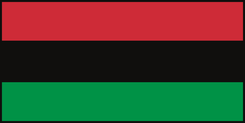Honoring Estelle Black
|
The African American Gallery is proud to unveil it's most recent exhibit honoring Estelle Black.
Estelle M. Black, retired Assistant Executive Director of Rockford Public Library, earned her Bachelor of Science degree in sociology and psychology at Rockford College, and completed work for her Master’s degree in Library Science at the University of Wisconsin, Madison. The library at Rock Valley College is named the Estelle M. Black Library in Black's honor. Prior to her appointment as assistant executive director in 1980, she served as manager of the Montague Branch of Rockford Public Library where she became noted for developing unique programs and services to aid the multi-ethnic patrons of the branch. She also served as reference librarian at the Main Library. Previous library experience in Rockford included positions as assistant librarian at Auburn High School and Rock Valley College, and as Special Research and Development Librarian for Ipsen Industries, a division of Alco Standard Company. |
Mrs. Black was the first president of the Rockford (Women’s) Network following its organization in 1981. She served nine years on the Visiting Nurses Board and received their Outstanding Service Award. She also served nine years as a trustee of the Community Foundation of Northern Illinois - the last three years she served as chairman of the board. Mrs. Black is also a charter member and past president of Heritage Kiwanis Club. She is also a member of the Pi Gamma Omega Chapter of Alpha Kappa Alpha Sorority, Inc., having served as president in 2004-05.
One of five organizers of the Rockford Chapter of the National Council of Negro Women and a life member, she was named its first president. She is a charter member and past president of the Taus, Inc. service club and is also a long-time member of the League of Women Voters.
This exhibit will remain on display until Labor Day.
One of five organizers of the Rockford Chapter of the National Council of Negro Women and a life member, she was named its first president. She is a charter member and past president of the Taus, Inc. service club and is also a long-time member of the League of Women Voters.
This exhibit will remain on display until Labor Day.


